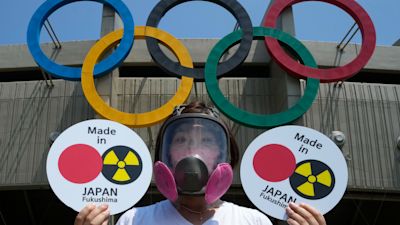Tokyo Olympics: Covid catastrophe or one golden moment after another?

There’s nothing an Olympic Games likes more than a new record and Tokyo has racked up quite a few of those even before the first drum beat or fancy hologram of Friday's Opening Ceremony.
The first delayed games, the most expensive, the first without local spectators or foreign fans - the full list is much longer and every item on it of course is connected to the curse of Covid-19 which still hangs threateningly over Tokyo.
And on Thursday, of all days, the city recorded yet another unwanted milestone, its highest level of infections for six months.
These Olympics are not immune to other crisis either.
In the past couple of days, the opening ceremony’s musical director quit over bullying allegations and its main director was sacked for comments he made about the Holocaust 23 years ago.
A turn of events that would usually send organisers into a panic has in fact has just been filed away in the bulging drawer of unexpected challenges from the last couple of years.
If you believe these games shouldn’t be going ahead in the first place, then you share the view of the vast majority of Japanese people.
They are terrified it will become a super-spreader event that sees the infection rate rocket and hospitals become overwhelmed.
The country’s medics are fearful this is a real possibility, but their expertise has been largely ignored.
Public sentiment is so strong Toyota, one of the Olympics’ biggest sponsors, will not be running games-related TV adverts in Japan for fear of a backlash.
For the same reason the motor giant’s boss will not be attending the opening ceremony; a move that has since been followed by many other Japanese VIP invitees.
The ceremony itself will be a scaled down, a more sombre affair than usual.
It will reflect the impact coronavirus has had and how all of us have lived through it.
There will be fewer athletes parading around the stadium and of course a scattering of onlookers in the stands.
What on the ground in Tokyo feels like a strange, dystopian, masked mass congregation is about to be shared via hundreds of millions of television sets.
But what of the next couple of weeks?
The International Olympic Committee (IOC) has driven these games through, refusing to accept at any stage the will of the Japanese people, but more than happy to count the billions of dollars broadcasters and sponsors have thrown at them.
Will they manage to pull off the coup of their lives and leave the world thanking them for an uplifting experience or will these games start to unravel as the ever-present coronavirus evades the extensive health protocols and spreads its sickly wings?
The truth is no one knows, not even IOC President Thomas Bach.
The athletes, who are following a daily testing regime and are allowed only limited contact with teammates, are hoping that there’s no more drama to come.
While phone calls or messages are welcome from home, the one contact they don’t want is with the Covid testers.
That means despite the five years’ sacrifice and despite the giant-sized hoops they’ve had to jump through just to be here, the journey is over, and the dream is dead.
Cruel yes, but it will be extraordinary, given the size of the Team GB contingent in Japan, if that nightmare doesn’t come to haunt one of them.
There is a Japanese saying which translated into English is: “Wake from the death and return to life.”
It describes an act of turning a desperate situation into a successful one.
As the Games get underway for real on Friday, the IOC will be praying that particular proverb will be rightfully applied to them on the night of the closing ceremony in 16 days’ time.